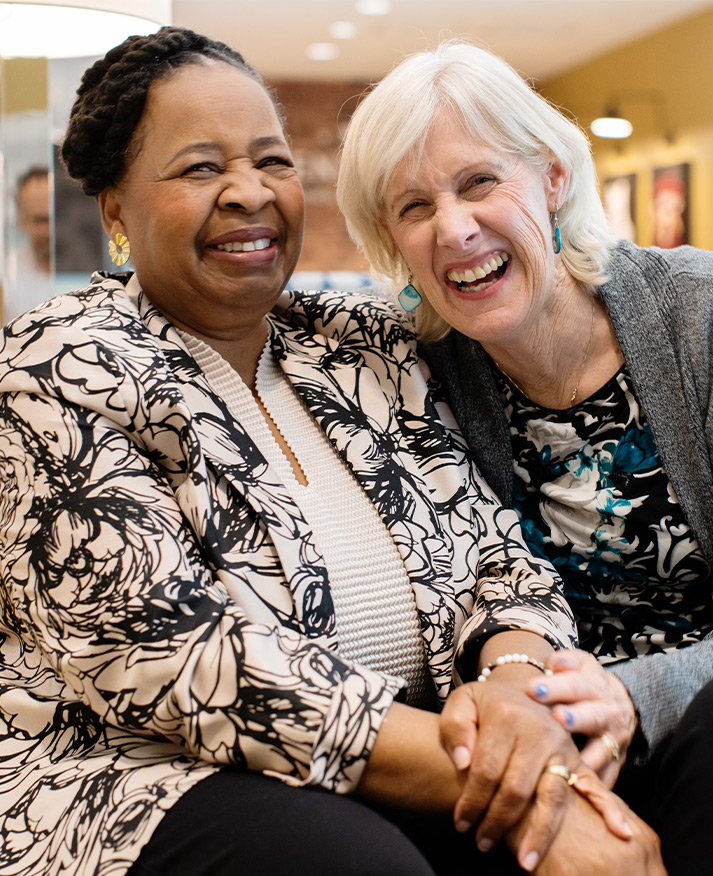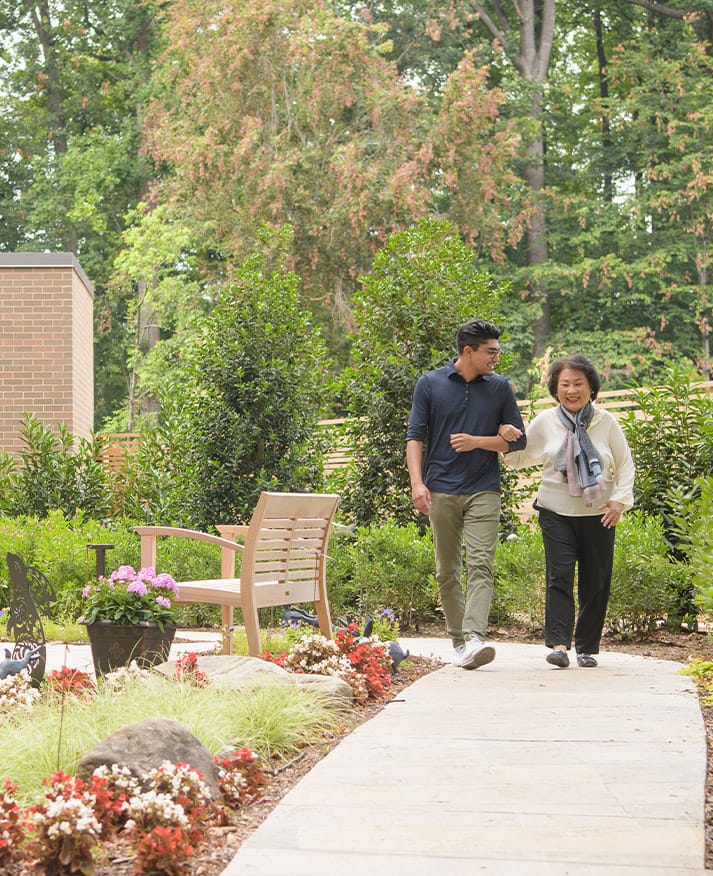The Benefits of Support Groups for Older Adults and Caregivers

Life is full of transitions. Some are planned, others are unexpected. As we age, new challenges can test even the most resilient among us. From managing health conditions to coping with loss or caring for a loved one, these experiences can feel overwhelming if you face them alone.
But you don’t have to. Support groups offer connection, understanding, and practical guidance. They create spaces where older adults and caregivers feel seen, valued, and empowered to move forward.
Below, we’ll explore the many ways support groups can enrich life in senior living communities and beyond, and why participating could be one of the most impactful choices you make.
Reducing Feelings of Isolation
Loneliness isn’t just an emotional state — it’s a health risk. Research shows that around one-quarter of community-dwelling adults aged 65 and older experience social isolation. Concerns about social isolation are not limited to senior living communities, either. 35% of adults aged 45 and older and 43% of adults aged 60 and older also report feeling lonely. Prolonged loneliness has been linked to higher rates of depression, anxiety, cognitive decline, and even premature death.
Moving into a retirement community can bring new opportunities for connection, but it also means leaving behind familiar social circles. Support groups help bridge this gap by providing meaningful and consistent contact.
Some of the ways support groups help reduce isolation include:
- Creating a routine. Weekly or biweekly meetings establish a predictable rhythm that many residents find comforting.
- Offering shared understanding. It’s easier to open up when everyone in the room has faced similar struggles.
- Building confidence. For individuals who feel shy or uncertain about meeting new friends, structured groups offer a gentle entry point into social life.
- Promoting belonging. Knowing you have “your group” can make a large community feel more personal and welcoming.
Over time, these connections often extend beyond the group itself, sparking new friendships and a stronger sense of community.
Building Emotional Resilience
Aging brings changes that can test emotional strength. Whether it’s coping with chronic illness, adjusting to a new living environment, or navigating grief, older adults often face challenges that require resilience and adaptability.
Support groups provide a safe space to discuss these feelings openly and learn from others who have navigated the same path. When you share your experiences and listen to others, you can:
- Gain new perspectives. Hearing how someone else manages a similar challenge can spark ideas for your own journey.
- Feel validated. Simply knowing your emotions are normal can lessen feelings of shame or self-blame.
- Develop practical coping skills. From mindfulness exercises to problem-solving strategies, group discussions often uncover helpful tools.
- Experience hope. Seeing others further along in their healing process can remind you that progress is possible.
Over time, participating in a support group can transform how you respond to life’s setbacks and build a stronger foundation for emotional health.
Improving Health Outcomes
While support groups primarily focus on emotional well-being, the benefits can extend to your physical health as well. In fact, studies consistently show that social connections play a critical role in overall wellness.
According to a meta-analysis published in PLOS Medicine, people with strong social relationships have a 50% greater likelihood of survival over time compared to those who are more isolated. That’s a more powerful predictor of longevity than even obesity or smoking.
Here’s how support groups can lead to better health outcomes:
- Encouraging consistent self-care. Members often remind each other to attend medical appointments, take medications, and follow treatment plans.
- Reducing harmful stress. Chronic stress is linked to inflammation and many illnesses; emotional support helps buffer its effects.
- Promoting healthier habits. Groups may share tips for nutrition, exercise, and sleep that improve daily functioning.
- Identifying red flags. Peers or facilitators may notice changes in mood or behavior that indicate the need for additional help.
By prioritizing social connection through support groups, older adults can take proactive steps toward a healthier, more vibrant life.
Fostering Personal Growth and Purpose
For many older adults, support groups offer more than comfort; they spark renewed purpose.
Becoming part of a group can:
- Inspire learning and self-reflection,
- Build confidence through mutual encouragement, and
- Provide opportunities to mentor or guide others.
Whether it’s a bereavement group, a wellness circle, or a caregiving cohort, participants often discover that giving support can be just as healing as receiving it.
Empowering Caregivers
There’s no question that caregiving is an act of love. But even the most devoted caregivers can find themselves physically exhausted, emotionally drained, and unsure where to turn for support. It’s a role that can be deeply rewarding and profoundly isolating.
According to the National Alliance for Caregiving, 72% of caregivers reported high emotional stress when they felt alone, compared to just 24% of caregivers who felt supported. That difference speaks volumes about the power of connection.
Caregiver support groups create space to breathe, share, and grow. Whether you’re a spouse, sibling, adult child, or friend caring for someone you love, a group can help lighten the emotional load and offer practical insight.
Some of the most meaningful benefits of caregiver support groups include:
- Validation and emotional relief. It’s powerful to hear “me too” from someone who genuinely understands what you’re going through.
- Burnout prevention. Groups encourage self-care and help caregivers set healthy boundaries before reaching a crisis point.
- Problem-solving support. You’ll hear real-world strategies for managing day-to-day challenges, from medication reminders to navigating difficult conversations.
- Educational value. Many groups share resources on legal rights, financial planning, and care coordination that empower you to make informed decisions.
- Reduced guilt. Caregivers often feel like they should “do it all.” Groups can gently challenge that mindset and remind members that their well-being matters, too.
- Connection and camaraderie. Friendships formed in these groups often become a lifeline, especially when others in your circle don’t fully grasp the demands of caregiving.
Ultimately, caregiver support groups remind participants that they can care for someone else without losing themselves in the process. With the proper support, caregiving can become more sustainable and even more meaningful.
Tips for Finding the Right Support Group
Joining a support group is a personal decision, and finding the right fit can make all the difference. The goal is to connect with a group where you feel comfortable, understood, and supported. Whether you’re an older adult seeking connection or a caregiver navigating complex emotions, the following tips can help you take that first step with confidence:
Consider the format that works best for you. Support groups may meet in person, online, or in hybrid formats. Virtual groups can offer flexibility, while in-person meetings provide face-to-face connection. Think about what feels most accessible and comfortable for your lifestyle.
Ask about facilitation. Some groups are peer-led, while trained professionals like social workers or therapists moderate others. Professionally facilitated groups often offer more structure, guidance, and conflict management, especially important for sensitive topics.
Start with a trial session. You’re not expected to commit right away. Most groups welcome newcomers to sit in on a session or two before deciding whether to join long term. It’s okay to try different groups until one feels like the right fit.
Match the group to your needs. Look for a group focused on your specific experiences, whether that’s caregiving, grief, chronic illness, or adjusting to community life. The more closely aligned the group’s focus is to your situation, the more helpful it’s likely to be.
Check accessibility and schedule. Make sure the group meets at a time and place that works for you and that any physical, cognitive, or technological needs are supported. Some communities offer transportation assistance or tech help to ensure everyone can participate.
Pay attention to group culture. Every group has its dynamic. Some are more structured, others more conversational. Some emphasize education, while others focus on emotional sharing. Try to find one that matches your comfort level and communication style.
Talk to your community’s life enrichment director or social services team. Associates at senior living communities like Watermark can help connect you with support groups on-site or in the surrounding area. They may also be able to recommend groups tailored to specific health conditions or family situations.
Reevaluate as your needs change. You may outgrow one group and benefit from another later. It’s perfectly normal to reassess and explore new support options as your circumstances evolve.
Whether you’re looking for emotional support, education, or simply the comfort of being understood, there’s a group out there that’s right for you. Taking that first step might feel intimidating, but it could also be the beginning of something deeply meaningful.
What Does the Research Say About Online Support Groups?
While many people think of support groups as in-person gatherings, there is growing evidence that online support groups can be impactful, sometimes even more so for certain individuals.
A comprehensive 2024 systematic review published in Communications Psychology, part of the Nature research journals, analyzed 100 studies on online support groups for adults managing chronic health conditions, caregiving stress, and significant life transitions. The findings reveal important insights that can help you decide whether a virtual group might be a good fit:
- Improved social connection. Participants frequently reported feeling less lonely and more emotionally supported by peers, even when connecting only online. Sharing experiences in a safe digital space helped them feel seen and understood.
- Positive behavioral changes. Many individuals adopted healthier habits and coped more effectively with daily challenges. For example, some studies showed that regular online meetings encouraged participants to stay on track with medication, exercise routines, or self-care practices.
- Mixed health outcomes. While some studies demonstrated improvements in pain levels, overall well-being, or quality of life, others found no measurable change in physical health. Researchers emphasized that outcomes may depend on the specific group structure and level of engagement.
- Potential for emotional distress. The review also highlighted that, in some cases, reading distressing stories or engaging with unmoderated discussions could increase feelings of anxiety or sadness. It underscores the importance of choosing groups led by experienced facilitators who set clear guidelines and provide appropriate support.
Overall, the study concluded that online support groups can be a valuable complement to in-person connections, especially when thoughtfully designed. For older adults, caregivers, or those managing chronic conditions, virtual groups can offer flexibility and access to specialized communities that might not be available locally.
Tips for exploring online options:
- Look for groups affiliated with reputable organizations or senior living communities.
- Check whether sessions are moderated by trained professionals.
- Start with a trial meeting to see how it feels.
- Consider balancing online participation with in-person connections to create a well-rounded support network.
If you’re curious about exploring online or hybrid support groups, consider reaching out to a local senior center, community organization, or retirement community near you to learn more about what’s available. Many communities, including Watermark senior living communities, can help you find a group that feels comfortable, welcoming, and right for your needs.
Frequently Asked Questions About Support Groups in Senior Living Communities
Most senior living communities offer a variety of support groups designed to meet residents’ emotional and social needs. These may include:
- Grief and bereavement groups,
- Caregiver support circles,
- Chronic illness or condition-specific groups (e.g., Parkinson’s, heart health, diabetes),
- Memory care support for early-stage dementia,
- Transition support for new residents, and
- General wellness and mental health support.
Some communities also host interest-based groups that support identity and belonging, such as LGBTQ+ groups or veteran support gatherings.
Support groups in senior living communities help older adults:
- Reduce feelings of loneliness and isolation,
- Share challenges and solutions in a safe environment,
- Improve mood and mental well-being,
- Strengthen social ties and build friendships, and
- Feel more connected to their community.
Research shows that older adults who engage in meaningful social connections experience better health outcomes, reduced stress, and greater life satisfaction.
Yes. Many communities welcome caregivers, both on-site and off-site, to participate in support groups specifically designed for their needs. These groups often address caregiver stress, decision-making, burnout prevention, and emotional well-being.
Some senior living communities also offer educational sessions and hybrid options so long-distance caregivers can participate virtually.
Absolutely. Most communities encourage new participants to attend a session with no pressure to speak or commit. Observing a meeting can help you decide if the group’s tone and focus are a good match for your needs.
In many retirement communities, support groups are included as part of the broader wellness or life enrichment program. If a group includes external facilitators or specialized therapy, there may be a small fee, but this is usually clearly communicated up front. Always ask the community team if you’re unsure.
The best way to find out is to:
- Call the community directly and ask to speak with the life enrichment director or equivalent.
- Visit the community website to review their monthly activity calendar.
- Schedule a tour and ask about current or upcoming groups during your visit.
If you’re not part of a senior living community, your local senior center, hospital, or Area Agencies on Aging can often provide a list of local support options.
Yes. Many communities and nonprofit organizations now offer online support groups via Zoom or other platforms. These are especially helpful for caregivers who live at a distance, or for residents with limited mobility or health concerns.
Virtual groups can provide flexibility while still offering meaningful emotional support and connection.
Yes, confidentiality is a core principle of nearly all support groups. Whether peer-led or professionally facilitated, groups typically follow clear guidelines to protect participants’ privacy and create a respectful, safe space. Most facilitators remind the group about confidentiality rules at the beginning of each session.
Feeling nervous at first is completely normal. Many people hesitate before joining their first session, but most discover that even simply listening offers relief. You’re never required to speak, and you can participate in a way that feels right for you. Over time, many find these groups to be an unexpected source of strength and connection.
Support groups are just one part of a holistic approach to well-being. Many retirement communities integrate them with fitness classes, creative programs, spiritual opportunities, and lifelong learning. At Watermark, for example, these offerings are part of a broader commitment to mind-body wellness and personalized care.
Support That Strengthens the Whole You
At Watermark Retirement Communities®, we understand that well-being goes beyond physical care. It’s about connection, purpose, and emotional balance. That’s why we’ve built communities where residents and families can find not only support, but also understanding, encouragement, and meaningful relationships.
From support circles and caregiver groups to wellness classes and enrichment programs through Watermark University, we offer resources designed to meet you where you are and help you grow from there. Whether you’re facing a transition, caring for a loved one, or simply looking for more connection in your life, you’re not alone. We’re here to walk with you.
If you’re curious about what support looks like in action, we invite you to visit a Watermark community, speak with our team, or explore our programs firsthand. There’s a place for you here.
A First Step Toward Feeling Understood
The road ahead doesn’t have to be walked alone. Whether you’re navigating aging, caregiving, or loss, support groups offer more than just comfort. They offer clarity, resilience, and a community that gets it.
Reaching out might feel vulnerable. But often, it’s the most powerful step you can take. You don’t have to have the right words or the correct answers — just a willingness to explore connection. And when you do, you’ll find people ready to listen, share, and walk beside you.
If you’re ready to experience the difference support can make, we’re here to help answer any questions you may have.


